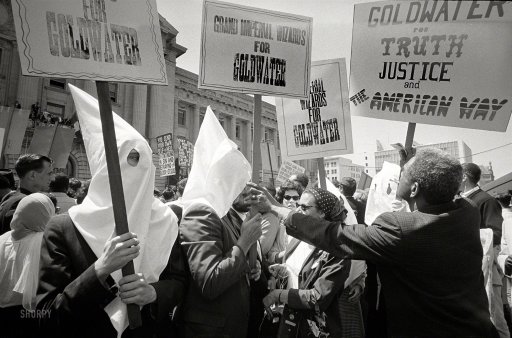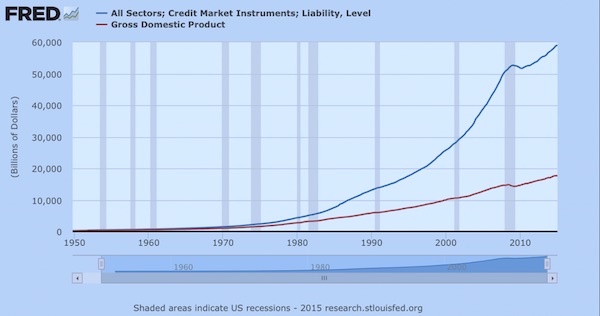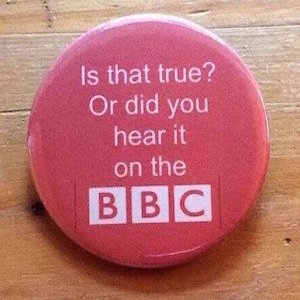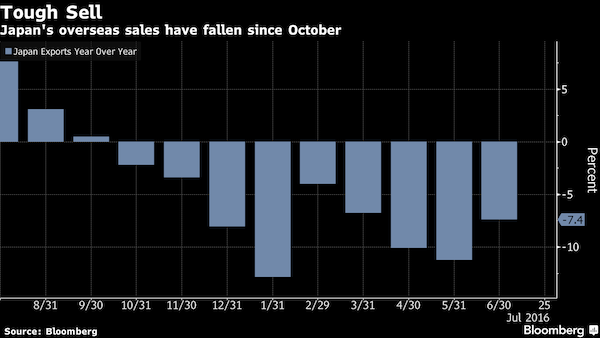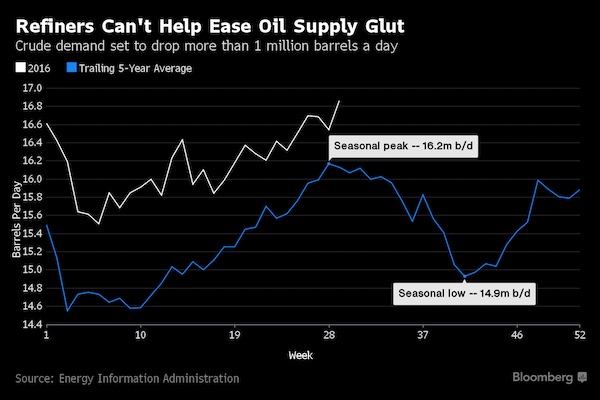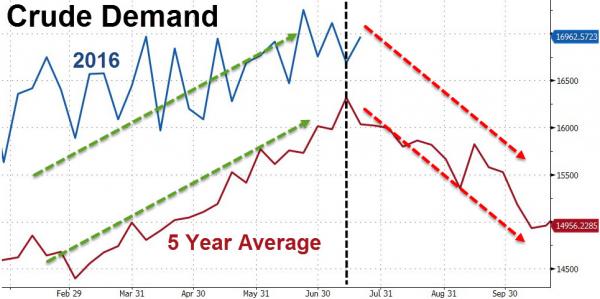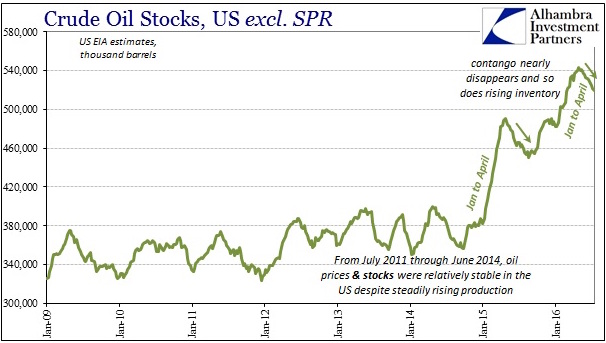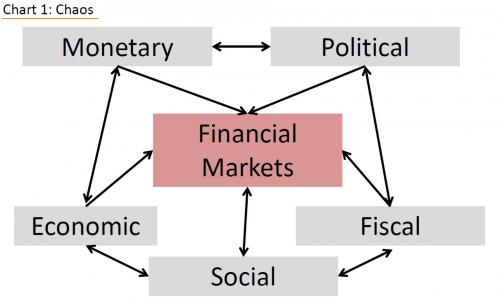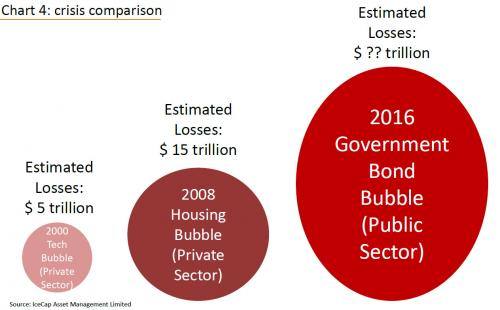
John Vachon Five o’clock crowds, Chicago 1941

Abenomics must end in full-blown madness.
• Japan PM Unveils More Than $266 Billion Stimulus (AFP)
Japan on Wednesday announced a whopping economic stimulus package worth more than 28 trillion yen ($266 billion), media reported, to boost the stumbling economy. Prime Minister Shinzo Abe announced the package in a speech in southwestern Japan, giving few details except to say it would include about 13 trillion yen in government spending, according to Jiji Press news agency.

“..scrapping dividend payments to shareholders, thousands of job cuts and asset sales…”
• Deutsche Bank’s Q2 Net Income Plunges Nearly 100% Year-On-Year (CNBC)
Deutsche Bank, the German bank which is an important part of the global financial system, announced revenue and income falls Wednesday which could add further concerns for investors made jittery by a combination of Brexit and previous issues at the bank. Its second-quarter net income was down 98% from the same period in the previous year, to 20 million euros ($22 million), as it exited parts of its business while revenues were down 20% to 7.4 billion euro. Further cuts may be needed, John Cryan, chief executive of Deutsche Bank, warned. “If the current weak economic environment persists, we will need to be yet more ambitious in the timing and intensity of our restructuring,” he said in a statement.
Deutsche’s CET1 ratio – a key measure of financial strength – improved slightly to 10.8%. The bank, one of Germany’s largest lenders, has lost around 40% of its market value this year as concerns mount about its capital position and $14 billion in fines over past misconduct. John Cryan, the bank’s co-chief executive who was appointed in July last year, has embarked on a drastic plan to meet its capital targets, including scrapping dividend payments to shareholders, thousands of job cuts and asset sales. Raising new capital is likely to be difficult because of the bank’s holdings of debt for some of the worse off euro zone countries.

As I’ve said 100 times: “China’s “shadow banking” system is masking the rise in indebtedness..”
• China’s Debt Problem May Be Worse Than Expected, Moody’s Warns (CNBC)
China’s “shadow banking” system is masking the rise in indebtedness in China, Moody’s Investors Service said in a report Wednesday. The rating agency said overall leverage in China’s economy continued to rise with credit growth outpacing the rise in nominal GDP. “The growth in overall leverage may be understated, because some of the fastest growing components of shadow banking are not included in TSF (total social financing),” said Michael Taylor, Moody’s chief credit officer for Asia Pacific. The credit growth was measured using TSF, an economic barometer of total fundraising by Chinese non-state entities, including individuals. It didn’t, however, include all shadow banking activities, which have grown in recent years.
“We estimate the potential understatement to be significant, amounting to at least RMB16 trillion ($2.4 trillion) or 23% of GDP at end-2015, equivalent to around one-third of shadow banking,” Taylor added. Moody’s said TSF flows were being sustained by formal bank credit flows supported by accommodative monetary policy. The increasing leverage was worrying. “The rise in overall leverage and further expansion of shadow banking activity are pushing up financial risks,” said Stephen Schwartz, a Moody’s senior vice president.

Shadow banks and their ‘wealth’ products.
• China Stocks Tumble on Report of Wealth Management Product Curbs (BBG)
Chinese stocks slumped the most in six weeks amid concern regulators are moving to limit equity investments by some wealth-management products. The Shanghai Composite Index fell 1.6% at the mid-day break, reversing a gain of as much as 0.2%. The Shenzhen Composite Index lost 3%, while the ChiNext Index of small-company shares sank 4%, the most since June 13. China’s banking regulator is considering tightening curbs on the nation’s $3.6 trillion market for WMPs, the 21st Century Business Herald reported, citing people it didn’t identify. Authorities may set a limit on how much WMPs can invest in equities and “non-standard assets” such as loans, the report said.
“There’s an obvious trend that the regulators want to strengthen market monitoring and lower the use of leverage in financial markets to control risks,” said Dai Ming at Hengsheng Asset Management. “Under such circumstances, Chinext is especially vulnerable, given its high valuations and the recent gains.” The China Banking Regulatory Commission met with some banks this month on the rule revision and a final version hasn’t been drafted, the 21st Century Business Herald report said. China’s watchdogs have signaled they’re paying closer attention to the fund managers and brokerages who funnel the nation’s household savings into investments from stocks to bonds and derivatives.
The China Securities Regulatory Commission this month issued guidelines curbing the use of leverage by structured asset management plans. Li Chao, vice chairman of the regulator, told a gathering of firms in the northeastern city of Harbin last week to do better due diligence on prospective clients when arranging initial public offerings, secondary share sales and bond issues, people familiar with the matter said.
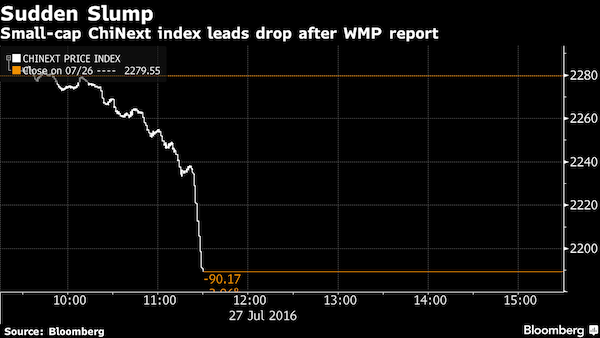

Hong Kong=Japan=China. Exact same pattern. World trade collapsing. If Hong Kong weren’t so dependent on imports, those would fall much more than 5.6%. “Domestic exports to the United Kingdom [..] plunged 48.2% in June.”
• Hong Kong Imports/Exports Plunge in Line with Japan and China (R.)
Hong Kong’s total exports in June fell for the 14th straight month, dampened by a slowdown in China, with the city’s factories bracing for more pain in coming months from the impact of Brexit. Open and trade-dependent economies in Asia such as Hong Kong are expected to be among the most vulnerable to a slowdown in global trade from Britain’s shock vote to leave the European Union as the effects filter through factory supply chains, analysts say. Hong Kong’s total exports in June fell 1% from a year earlier to HK$296.5 billion ($38.2 billion), government data showed on Tuesday. Total imports fell 0.9%, in its 17th straight month of decline, to HK$342.1 billion. In May, annual exports slipped 0.1% while imports dropped 4.3%.
For the first half of 2016, total exports value dropped 3.9%, while imports fell 5.6%. The city recorded a visible trade deficit of HK$199.6 billion for the first half period, equivalent to 10.8% of the value of imports. “Looking ahead, the external trading environment remains challenging given the uncertainties associated with the outcome of the UK referendum in favor of leaving the EU, slow recovery in the advanced markets, monetary policy divergence among major central banks and heightened geopolitical tensions in various regions,” the government said, adding it will monitor the situation closely. Domestic exports to the United Kingdom, which accounted for 2.2% of the total, plunged 48.2% in June.

Well, not really, it’s all just about demand.
• A Refinery-Driven Correction Is Upon Us’ (BBG)
Gear up for a fall in oil prices. The global oil market is “severely oversupplied” with gasoline — with stocks at a five-year high — serving as a blow to crude prices from next month, reckon Morgan Stanley analysts led by Adam Longson. In a report published on Sunday, the analysts foresee “worrisome trends” for oil supply and demand, led by refineries generating too much gasoline in recent months. Faced with the need to cut back on capacity utilization to protect profit margins, these refineries are set to crimp crude oil purchases and drag prices lower, the analysts say. “Crude oil demand is trending below refined product demand for the first time in three years,” they write.
“Refineries are the true consumer of crude oil, and crude oil demand is ultimately more important than aggregate refined product demand for oil balances. Given the oversupply in the refined product markets, fading refinery margins, and economic run cuts, we expect crude oil demand to deteriorate further over the coming months.” A glut of gasoline could weigh significantly on oil prices, which have been lifted in recent weeks by supply disruptions and healthy petrol demand in emerging markets. Excess gasoline also means that refiners may close their doors sooner and for longer than usual during their traditional summer production shutdown, taking further demand out of the market.
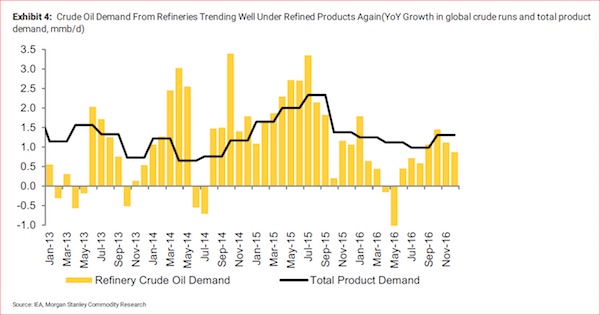

Reading through a piece like this, it becomes even more surprising that Brexit was a surprise to so many Brits.
• Cameron Was Right, Britain Is Broken (G.)
In opposition, David Cameron battered Gordon Brown with two words: Broken Britain. It was his Murdoch-inspired catchphrase for hoodies scrapping in gangs, Neets necking alcopops, teenagers ending up pregnant. It set the framework for Iain Duncan Smith’s welfare reforms. Broken Britain summed up the dark side of the New Labour era: a busted social contract and a class wantonly sponging off the rest of society. It always struck me as the right phrase for the wrong target. The real Broken Britain is the one revealed over the past four days in two reports from MPs. It is workers urinating into bottles at the “Victorian workhouse” of Sports Direct, because their toilet breaks are restricted. It is women being offered permanent jobs in return for sexual favours.
It is BHS, a high-street chain nearly as old as the Queen, effectively killed by two “plundering” owners. It is 10,000 shop workers who will shortly be out on the streets, and 20,000 pension-scheme members who must now worry over how much they’ll have to live on in their old age. The riots of 2011 were taken by Cameron as proof he’d been right all along: “Irresponsibility. Selfishness. Behaving as if your choices have no consequences … Reward without effort. Crime without punishment. Rights without responsibilities.” This is Philip Green and Mike Ashley summed up – along with all the well-heeled consultants, directors and credulous politicians (including Cameron) who applauded and subsidised them on their way, bought off with fat fees and cheap photo-ops.
The rioting kids who stole bottles of water and robbed tellies from their local Argos were given prison sentences worth a total of 1,200 years. By contrast, Green and Ashley weren’t even going to bother facing MPs. Only after five months of back and forth did Sports Direct’s Ashley get in the chauffeured car down to Westminster. Green went one better, demanding that Frank Field resign from the BHS inquiry – then rocking up to parliament and telling MPs to stop looking at him. Such prickliness from a multibillionaire would have been funny had it not been for the thousands of families whose lives he’d just ruined.

Wow. I found a few sentences at Reuters that sound somewhat sensible on the topic. “If the Russians hadn’t hacked us (for which we have no proof), Americans would have never found out about what we did.” Dumb f**ks!
• Kremlin Says Idea It Hacked Democratic Party Emails Absurd (R.)
“We are again seeing these maniacal attempts to exploit the Russian theme in the U.S. election campaign,” Kremlin spokesman Dmitry Peskov told reporters when asked about the leaked emails. “This is not breaking new ground, this is an old trick which is being played again. This is not good for our bilateral relations, but we understand that we simply have to get through this unpleasant period.” U.S. Secretary of State John Kerry said earlier on Tuesday he had raised the hacking issue at a meeting in Laos with Russian Foreign Minister Sergei Lavrov. “I don’t want to use four-letter words,” was Lavrov’s only response to reporters when asked whether Russia was responsible for the email hack.
Earlier this month, Carter Page, a foreign policy adviser to Trump, visited Moscow, where he gave a lecture complaining that Western governments had often had a hypocritical focus on democratization in the post-Soviet world. Analysts say the Kremlin would welcome a Trump win because the billionaire U.S. businessman has repeatedly praised Putin, spoken of wanting to get along with Russia, and has said he would consider an alliance with Moscow against Islamic State. Trump’s suggestion he might abandon NATO’s pledge to automatically defend all alliance members is also likely to have gone down well in Moscow, where the military alliance is cast as an outdated Cold War relic.

“Assange told CNN that Democratic Party officials were using the specter of Russian involvement to distract from the content of the emails..”
• Assange: “A Lot More Material” Will Be Released (ZH)
One month ago, when Wikileaks’ Julian Assange told ITV’s Richard Peston that he would publish “enough evidence” to indict Hillary Clinton, few took him seriously. And while Hillary has not been indicted – yet – last Friday’s leak has already managed to wreak havoc and has led to revelations of cronyism and collusion within the Democratic party and the media, the resignation of the DNC Chair Debbie Wasserman Schultz, as well as chaos on the first day of the Democratic convention. Hence, why we believe Assange will be taken more seriously this time. Earlier today, Assange told CNN that Wikileaks might release “a lot more material” relevant to the US electoral campaign. Assange spoke to CNN following the release of nearly 20,000 hacked Democratic National Committee emails.
The topic then turned to the topic du jour: “did Putin do it”? Assange refused to confirm or deny a Russian origin for the mass email leak, saying Wikileaks tries to create ambiguity to protect all its sources. “Perhaps one day the source or sources will step forward and that might be an interesting moment some people may have egg on their faces. But to exclude certain actors is to make it easier to find out who our sources are,” Assange told CNN. The Kremlin has rejected allegations its behind the hacking, calling suggestions it ordered the release of the emails to influence US politics the “usual fun and games” of the US election campaigns, while the Russian foreign minister had an even simpler reaction to the same question: “I don’t want to use four-letter words.”
Dmitry Peskov, the Kremlin spokesman, added, “This is not really good for bilateral relations.” All of this now appears to be irrelevant, and as we speculated earlier, the “anti-Russia” narrative is now in motion and moments ago Obama said that it’s ‘possible’ Putin is trying to sway vote for Trump. Which brings us to the next point: speaking from the Ecuadorian embassy in London, where he faces extradition over sexual assault allegations, Assange told CNN that Democratic Party officials were using the specter of Russian involvement to distract from the content of the emails, which have had tumultuous affect on the party at the start of its national convention [..]

And you think Trump is the danger? These are the people who shed blood around the globe. These are the people responsible for the terrorist attacks against the west.
• The Neocons Are Backing Hillary Clinton (Intercept)
As Hillary Clinton puts together what she hopes will be a winning coalition in November, many progressives remain wary — but she has the war-hawks firmly behind her. “I would say all Republican foreign policy professionals are anti-Trump,” leading neoconservative Robert Kagan told a group gathered around him, groupie-style, at a “foreign policy professionals for Hillary” fundraiser I attended last week. “I would say that a majority of people in my circle will vote for Hillary.” As the co-founder of the neoconservative think tank Project for the New American Century, Kagan played a leading role in pushing for America’s unilateral invasion of Iraq, and insisted for years afterwards that it had turned out great.
Despite the catastrophic effects of that war, Kagan insisted at last week’s fundraiser that U.S. foreign policy over the last 25 years has been “an extraordinary success.” Republican presidential nominee Donald Trump’s know-nothing isolationism has led many neocons to flee the Republican ticket. And some, like Kagan, are actively helping Clinton, whose hawkishness in many ways resembles their own. The event raised $25,000 for Clinton. Two rising stars in the Democratic foreign policy establishment, Amanda Sloat and Julianne Smith, also spoke.
The way they described Clinton’s foreign policy vision suggested that if elected president in November, she will escalate tensions with Russia, double down on military belligerence in the Middle East and generally ignore the American public’s growing hostility to intervention. Sloat, the former deputy assistant secretary of state in the Bureau of European and Eurasian Affairs, boasted that Clinton will be “more interventionist and forward-leaning than Obama’s been” in Syria. She also applauded Clinton for doing intervention the right way, through coalitions instead of the unilateral aggression that defined the Bush years.

“What higher service to democracy than to expose the anti-democratic workings of the party that affects to call itself Democratic? ”
• The Odious Versus the Tedious (Kunstler)
You thought the Republican convention was a ghastly spectacle of royal Trumpery (and Iago-style backstabbing featuring the arch-asshole Ted Cruz)? Now comes the Democratic Annunciation of I’m-With-Her-It’s-My-Turn, the incarnation of crony corruption in our late-state Republic of Racketeering. Remember that old movie, The Exorcist, with its demonic spewage of projectile vomit. Expect something like that on the grand scale in Philadelphia this week as the Exalted-Breaker-of-Glass-Ceilings steps forth to accept her victory tiara.
The New York Times is blaming the Ruskies for releasing those thousands of new emails disclosing the perfidy of the Democratic National Committee staff in pimping for Hillary against Bernie and trafficking with the major network news operations to manage and spin things Her way — and especially to rig the electoral machinery against Sanders. How much will his supporters Feel the Bern this week in Philly as the party attempts to put on an appearance of unity (Ha!) behind HRC? How can it conceivably be possible now for Bernie to stand by her side for the crucial unity photo op? I suspect he’d rather chew his right arm off.
For my money, the Ruskies should get the Nobel Peace Prize if they were behind the email release. What higher service to democracy than to expose the anti-democratic workings of the party that affects to call itself Democratic? The sudden appearance of 20,000 smoking guns made party chairperson Debbie Wasserman-Schultz vamoose faster than you can say Debbie Wasserman Schultz, though her replacement, Donna Brazile is every inch just another blatant HRC foot-soldier. Perhaps she’ll have to orchestrate the proceedings with smoke signals or invisible ink instead of emails.
As the conventions rolled out, the aggregate miasma we call the news industry resorted to that tired trope of Optimism Versus Pessimism. Translation: you can’t handle the truth so somebody please bring out the rainbow-leaping unicorns. The American zeitgeist is a tattered garment worn by a three hundred pound tranny in a diabetic coma. It’s probably beyond salvation at this point. Somebody please put it out of its misery. Hence: Trump Versus Hillary, the odious versus the tedious, the election to end all elections.

This makes too much sense.
• Auckland House Prices Must Deliberately Be Reduced By 50% – NZ Greens (RNZ)
Auckland house prices should be deliberately reduced by up to 50% over a period of time to make the market affordable again, Greens co-leader Metiria Turei says. The average house price in Auckland has risen to nearly $1 million, or 10 times the median household income. Ms Turei said the only way to reverse that was to slowly bring prices back down to three or four times the median household income. She told Morning Report the Green Party was considering what timeframe would work without crashing the market and hurting people who already owned homes. “The only way to prevent a bust, and to protect families in the short and long term is to lay out a comprehensive plan, which means using every comprehensive tool that we’ve got so that we can slowly bring down house prices so that they’re reasonable.”
The Auckland Council’s chief economist had suggested bringing prices down to five times the median household income by 2030, she said. Labour leader Andrew Little said Ms Turei’s declaration that Auckland house prices should be deliberately reduced was irresponsible. There was no way a Labour-led government would consider the idea, he said. “We have a very clear plan. It’s not about crashing house prices. It’s about stabilising prices. “We don’t want to cause undue economic harm to those who – in good faith – have bought homes, entered into mortgages. That’s not a responsible approach.”

“Last month, Spain’s interior minister, Jorge Fernández Díaz, and the head of Catalonia’s anti-fraud office, Daniel de Alfonso, were apparently recorded discussing possible investigations that could be launched against pro-independence politicians in the region.”
• Catalonia Tells Spain It Will Push For Secession With Or Without Assent (G.)
The Catalan government has intensified its war of words with Spain by vowing to use its democratic mandate to forge a separate Catalan state with or without the approval of Madrid. Catalonia is preparing to defy Spain’s constitutional court this week by debating the conclusions of a working group on sovereignty, nine months after the Catalan parliament put forward a resolution calling for the “beginning of a process of the creation of an independent Catalan state”. Carme Forcadell, the president of the parliament, and Raül Romeva, the minister of foreign affairs, told the Guardian enduring hostility from Madrid had left Catalonia with no choice but to press ahead with the independence agenda.
“The [Spanish state] has left us feeling that we just don’t have an alternative,” Romeva said. “We have always said that we would have preferred a Scottish-type scenario, where we could negotiate with the state and hold a coordinated and democratic referendum. We keep talking to Madrid, but all we get back from them is an echo.” Forcadell pointed to a recent scandal as evidence of the Spanish government’s attitude towards Catalonia. Last month, Spain’s interior minister, Jorge Fernández Díaz, and the head of Catalonia’s anti-fraud office, Daniel de Alfonso, were apparently recorded discussing possible investigations that could be launched against pro-independence politicians in the region.
Forcadell said she was incredulous at the idea that the acting Spanish government, led by Mariano Rajoy, could simply brush aside the alleged incident and say nothing was going on. “How can they say that when the interior minister, who’s meant to defend the interests of all citizens, is caught conspiring to find evidence against citizens solely because they think differently? How can absolutely nothing come of that? We don’t understand it,” she said.

The power of words.
• We Love To Talk Of Terror (Robert Fisk)
The frightful and bloody hours of Friday night and Saturday morning in Munich and Kabul – despite the 3,000 miles that separate the two cities – provided a highly instructive lesson in the semantics of horror and hypocrisy. I despair of that generic old hate-word, “terror”. It long ago became the punctuation mark and signature tune of every facile politician, policeman, journalist and think tank crank in the world. Terror, terror, terror, terror, terror. Or terrorist, terrorist, terrorist, terrorist, terrorist. But from time to time, we trip up on this killer cliché, just as we did at the weekend. Here’s how it went. When first we heard that three armed men had gone on a “shooting spree” in Munich, the German cops and the lads and lassies of the BBC, CNN and Fox News fingered the “terror” lever.
The Munich constabulary, we were informed, feared this was a “terrorist act”. The local police, the BBC told us, were engaged in an “anti-terror manhunt”. And we knew what that meant: the three men were believed to be Muslims and therefore “terrorists”, and thus suspected of being members of (or at least inspired by) Isis. Then it turned out that the three men were in fact only one man – a man who was obsessed with mass killing. He was born in Germany (albeit partly Iranian in origin). And all of a sudden, in every British media and on CNN, the “anti-terror manhunt” became a hunt for a lone “shooter”. One UK newspaper used the word “shooter” 14 times in a few paragraphs.
Somehow, “shooter” doesn’t sound as dangerous as “terrorist”, though the effect of his actions was most assuredly the same. “Shooter” is a code word. It meant: this particular mass killer is not a Muslim. [..] It all comes down to the same thing in the end. If Muslims attack us, they are terrorists. If non-Muslims attack us, they are shooters. If Muslims attack other Muslims, they are attackers. Scissor out this paragraph and keep it beside you when the killers next let loose – and you’ll be able to work out who the bad guys are before the cops tell you.

More power of words.
• The Power of “Nyet” (Dmitry Orlov)
The way things are supposed to work on this planet is like this: in the United States, the power structures (public and private) decide what they want the rest of the world to do. They communicate their wishes through official and unofficial channels, expecting automatic cooperation. If cooperation is not immediately forthcoming, they apply political, financial and economic pressure. If that still doesn’t produce the intended effect, they attempt regime change through a color revolution or a military coup, or organize and finance an insurgency leading to terrorist attacks and civil war in the recalcitrant nation. If that still doesn’t work, they bomb the country back to the stone age. This is the way it worked in the 1990s and the 2000s, but as of late a new dynamic has emerged.
In the beginning it was centered on Russia, but the phenomenon has since spread around the world and is about to engulf the United States itself. It works like this: the United States decides what it wants Russia to do and communicates its wishes, expecting automatic cooperation. Russia says “Nyet.” The United States then runs through all of the above steps up to but not including the bombing campaign, from which it is deterred by Russia’s nuclear deterrent. The answer remains “Nyet.” One could perhaps imagine that some smart person within the US power structure would pipe up and say: “Based on the evidence before us, dictating our terms to Russia doesn’t work; let’s try negotiating with Russia in good faith as equals.”
And then everybody else would slap their heads and say, “Wow! That’s brilliant! Why didn’t we think of that?” But instead that person would be fired that very same day because, you see, American global hegemony is nonnegotiable. And so what happens instead is that the Americans act baffled, regroup and try again, making for quite an amusing spectacle.

But it’s a billion-dollar industry!
• Leading Insecticide Cuts Bee Sperm By 40%, Lifespan By A Third (G.)
The world’s most widely used insecticide is an inadvertent contraceptive for bees, cutting live sperm in males by almost 40%, according to research. The study also showed the neonicotinoid pesticides cut the lifespan of the drones by a third. The scientists say the discovery provides one possible explanation for the increasing deaths of honeybees in recent years, as well as for the general decline of wild insect pollinators throughout the northern hemisphere. Bees and other insects are vital for pollinating three-quarters of the world’s food crops but have been in significant decline, due to the loss of flower-rich habitats, disease and pests and the use of pesticides.
Neonicotinoids were banned from use on flowering crops in the EU in 2013. The UK opposed the ban and allowed a limited “emergency” lifting of the ban in 2015, but has refused further suspensions this year. There is clear scientific evidence that neonicotinoids harm bees, but there is only a little research showing the pesticides harm the overall performance of colonies. Previous work has shown that neonicotinoids reduce the number of bumblebee queens produced and severely cuts the survival and reproduction of honeybee queens. But the new research, led by Lars Straub at the University of Bern, Switzerland and published in the journal Proceedings of the Royal Society B, is the first to test how neonicotinoids affect male bee fertility.

We’re really killing off our own family.
• LUCA: The Ancestor Of All Living Things On Earth (IBT)
The planet we live on is home to an estimated 10 million species of living organisms. Hard as it may be to fathom, the immense diversity of life we see around us today – from the bacteria living in the garden soil to the majestic blue whale inhabiting the deep blue seas – all evolved from one single-celled ancestor that lived, and died, billions of years ago. In a paper published Monday in the journal Nature Microbiology, researchers have described, in unprecedented detail, this Last Universal Common Ancestor, or LUCA, which was only “half alive.” This ancestor – a single-cell, bacterium-like organism – is believed to have existed roughly four billion years ago, when Earth was just over 500 million years old. LUCA, the researchers say, was the common point of origin for three great domains of life — bacteria, archaea, which are bacteria-like single-cell prokaryotes, and the eukaryotes, a domain that includes all plants and animals.

Phylogeny for LUCA’s genes: In the two-domain tree of life, eukaryotes stem from prokaryotes, so the last universal common ancestor, LUCA, is the ancestor of archaea and bacteria.
“We are seeing something for which there was previously no evidence,” co-author William Martin from the Heinrich Heine University in Düsseldorf, Germany, told the Washington Post. “Just by asking the right questions of genome data, we were able to obtain some very interesting answers that also mesh well with what we know from geochemistry.” In order to get a clear picture of what LUCA was like, the researchers examined over six million protein-coding genes found in the present-day bacteria and archaea. After analyzing the DNA sequence of each gene and determining whether these genes were present in both bacteria and archaea, the researchers identified 355 gene “clusters” that were probably present in LUCA. “It was flabbergasting to us that we found as many as we did,” Martin told New Scientist.


